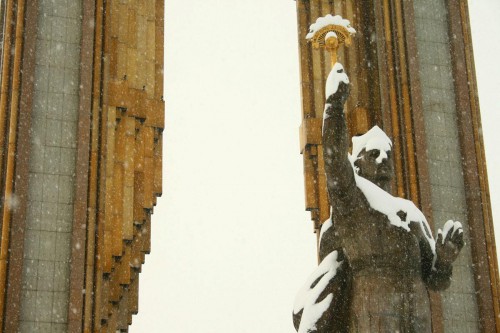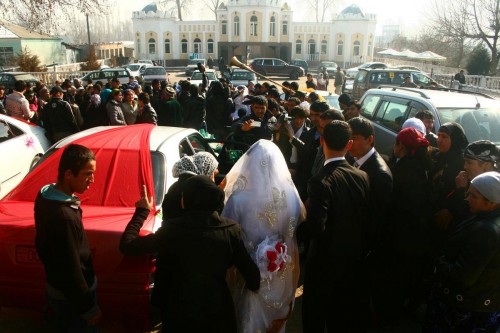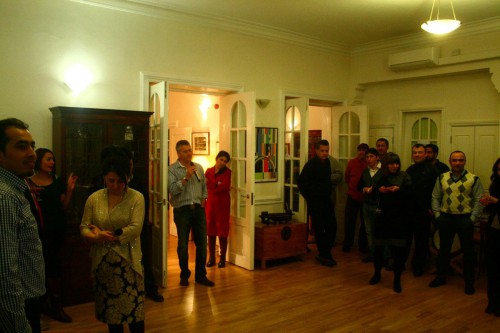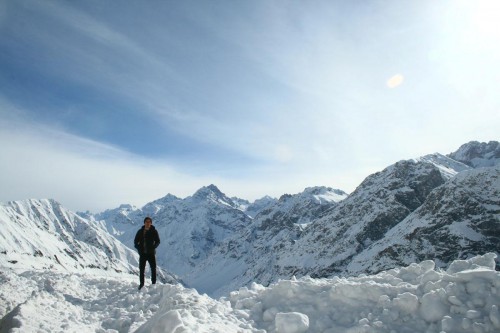12th February 2013 Dushanbe, Tajikistan
Parties, Plov and Perseverance
The following is a post by Robert Price, a Philosophy and Politics undergraduate at the University of Exeter who has recently completed an internship at the Embassy.

Give Her Majesty’s Ambassador to Tajikistan, Robin Ord-Smith, a karaoke machine, and he will show you that he has the voice of an angel. This is just one of the things I learnt during my two week internship with the British Embassy in Dushanbe, Tajikistan.
There’s nowhere in the world like Tajikistan. For a short time this January I had the opportunity to intern at the embassy in Dushanbe, a part of the world normally marginalised if not ignored altogether. With a recent hostage crisis in Algeria, intervention in Mali and escalating civil war in Syria, there are few column inches reserved for the less dramatic, though no less real, problems that the Central Asian states face.
Whether or not the experience is what I expected isn’t a question I can really answer – because going into this I had no idea what to expect. That said, Tajikistan has managed to consistently surprise me during my time here. And I have learned an immeasurable amount.

In my time I have organised embassy parties and issued visas. I have gatecrashed Tajik weddings and looked at the Embassy’s digital media strategy. I have dined at fine restaurants and prepared guidance for Foreign and Commonwealth Office visitors to the country.
I have shadowed the ambassador on meetings with local officials and tried my hand at Tajik speed-dating. My activities have been varied and they have been unpredictable. Such is the life in a reactive body like an Embassy, when one never knows what the next day may bring.
An important lesson that I have learned from all this is that no matter the workplace, no matter its location or the nature of its business, the basics still remain constant. Helping to take forward and address the results of the recent Staff Survey, it became clear that key issues, the essential skills of teamwork and clear communication stay the same, no matter the language or continent.
Having studied the region at university, on an academic level it has been of particular interest to see Tajikistan’s attempts at the creation of a coherent national identity. Infrastructural dependence on Russia and subsequent internecine conflict rendered the country initially unstable; the subsequent attempts to foster national unity using various techniques intrigued me.
This included the reclamation and veneration of historic Tajik heroes such as the poet Rudaki and leader Ismail Somoni, as well as deliberate derussification of both institutions and language – parallels can be drawn with other attempts at nascent state-building including 19th century Ireland, and certain Arab states following the Second World War.
Which path the country follows is unclear, but from what I have seen, I am optimistic.

It wasn’t all hard work though. During my downtime I got the chance to take a driver and explore the country a little – whilst the winter effectively prohibited travel too far afield, I still managed to get as far as the town Hizar, hoping to find Buzkashi (cancelled, sadly), and to the mountains south of Khujand, which are stunningly beautiful.
Going out for lunch with embassy staff to sample the local cuisine plov is something that I will remember fondly. The aforementioned embassy party too, was an experience without equal, and where I saw first-hand the Ambassador’s vocal talents.
I would venture to say that I had a little too much fun that night.
Another lesson learnt: Lenin’s maxim, told to me by the embassy’s Guard Supervisor Behzod, of “learn, learn, and learn”. It’s true, and remains as relevant now as it was in the country’s Soviet past; one must keep questioning, keep exploring, keep searching for answers.
Tajikistan has taught me that things are never straightforward, but perseverance is incredibly rewarding. After all, the country barely even registers on the public consciousness in Britain – but after making the effort, this opportunity has meant I know more about the little-known country then I ever could have guessed. And I am so much the better for it.

Tajikistan is a fascinating country. Its people are welcoming, its landscapes are beautiful. The problems the country faces are difficult, but not insurmountable. Even compared to other places I’ve travelled to like Syria, Tajikistan is most certainly off the beaten track, and not necessarily a place for the casual tourist.
But if you are ever in this part of the world, then take the time to explore and make the most of it. You won’t regret it.
You can follow Rob on Twitter @robaeprice and our Embassy @ukintajikistan
Dear Ingo-Steven,
I’m glad you enjoyed the piece. By all means use my photos and the piece, have you got any more information on the Study Group? If you want to contact me to ask any questions (or if anyone at the study group does), then my email is robaeprice[at]live.com, and my Twitter is @robaeprice.
Best,
Rob
Dear Robert,
dear Robin,
sorry – but I ´ve forgot : Thanks a lot for these impressive pics. If it ´s OK for the both of you, I ´ gonna show your complete report at the next meeting, German : “Stammtisch”, of the British Empire Study Group in Stuttgart.
Once again : Best wishes, Ingo-Steven
Dear Robert Price, dear Robin Ord-Smith,
well it looks to me that you ‘ve done and experienced a lot within the context of a just 2 weeks internship at the British Embassy in Dushanbe.Of course, I can ‘t confirm that the Ambassodor has “the voice of an angel”. I ‘ve never heard him live. But it takes surely courage to sing and perform in front of some people – esp. if they are colleagues from the team. You ‘ve wrota also about ” unprecedictable activities ” and that you didn ‘t never knew of “what the next day may bring “. To me that is life itself in the best way. Otherwise it starts to get boring. Doesn ‘t it ? And it ‘s great if you ‘ve a working place in which you can combine it. Otherwise your work is starting to become a matter of “routine”. And that ‘s to me not just a “cliche”, a stereotype.
There ś 1 sentence that spoke out of my heart : “..reserved for the less dramatic, though NO LESS REAL PROBLEMS…”. Between these wise lines I can read : We are living in a too fast turning world. If those problems are not big enough- they don ‘t sell enough. So forget about them tomorrow. It ‘s sad but fact. Nevertheless: Congratulations to a great report! BW, Ingo-Steven Wais, Stuttgart